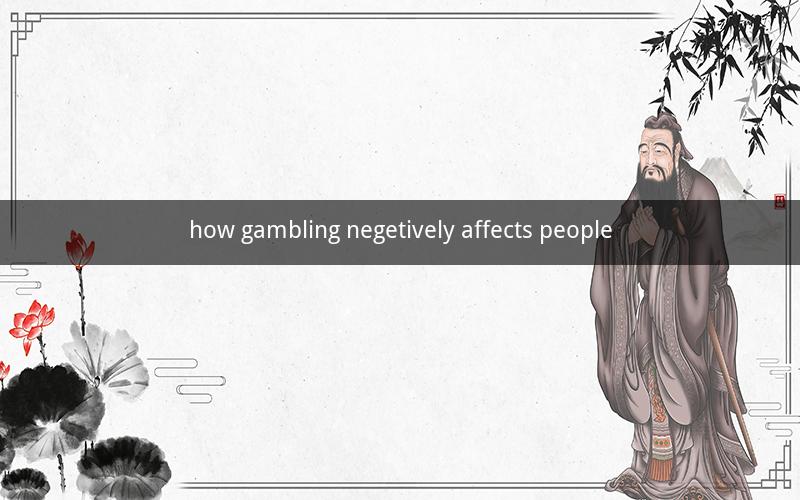
Table of Contents
1. Introduction
2. Understanding the Concept of Gambling
3. The Negative Psychological Impact
3.1. Stress and Anxiety
3.2. Depression and Mood Swings
3.3. Impaired Judgment
4. The Negative Physical Impact
4.1. Health Risks
4.2. Sleep Deprivation
4.3. Increased Risk of Addiction
5. The Negative Social Impact
5.1. Relationships and Family
5.2. Financial Consequences
5.3. Legal Issues
6. Prevention and Treatment
7. Conclusion
Introduction
Gambling, an activity that involves betting money or something of value on an event with an uncertain outcome, is a prevalent pastime for many individuals. While some may consider it a form of entertainment, the negative consequences of gambling can be devastating. This article explores how gambling negatively affects people, covering the psychological, physical, and social impacts. Furthermore, it delves into the prevention and treatment options available to mitigate the adverse effects of gambling.
Understanding the Concept of Gambling
Gambling can take various forms, such as lottery tickets, sports betting, casino games, and poker. The common thread among these activities is the element of risk and chance. Participants engage in gambling with the hope of winning money or prizes, often driven by the thrill and excitement associated with the game.
The Negative Psychological Impact
Stress and Anxiety
One of the primary negative psychological impacts of gambling is the stress and anxiety it can induce. The anticipation of winning and the fear of losing can lead to heightened stress levels, which can manifest in physical symptoms such as headaches, muscle tension, and gastrointestinal issues.
Depression and Mood Swings
Gambling can also contribute to feelings of depression and mood swings. The constant need for more money and the inability to satisfy this desire can lead to feelings of hopelessness and despair. Additionally, the unpredictable nature of gambling can cause individuals to experience rapid mood shifts, ranging from euphoria to despair.
Impaired Judgment
Gambling can impair judgment, leading to poor decision-making. The allure of potential winnings can cause individuals to take excessive risks, not only with their money but also in other areas of their lives. This impaired judgment can have long-lasting consequences, such as strained relationships, financial hardship, and legal troubles.
The Negative Physical Impact
Health Risks
Gambling can have significant health risks, including heart disease, stroke, and hypertension. The stress and anxiety associated with gambling can lead to elevated blood pressure, which increases the risk of these health conditions. Additionally, excessive gambling can lead to sleep deprivation, which can further exacerbate health issues.
Sleep Deprivation
Sleep deprivation is a common consequence of excessive gambling. The excitement and anxiety of the game can make it difficult for individuals to fall asleep or stay asleep, leading to fatigue and other related health issues.
Increased Risk of Addiction
Gambling can be addictive, with individuals developing a compulsive need to engage in the activity. This addiction can lead to significant negative consequences, including financial ruin, strained relationships, and even legal problems.
The Negative Social Impact
Relationships and Family
Gambling can strain relationships and cause family conflicts. The financial stress and anxiety associated with gambling can lead to arguments and resentment among family members. Additionally, the time spent on gambling activities can reduce the quality of time spent with loved ones.
Financial Consequences
Gambling can have severe financial consequences. The allure of potential winnings can lead individuals to take on excessive debt, leading to financial instability and potential bankruptcy.
Legal Issues
Gambling can also lead to legal issues, such as fraud, theft, and illegal gambling. The pressure to recoup losses can lead individuals to engage in illegal activities, which can have serious legal consequences.
Prevention and Treatment
Prevention and treatment are essential in mitigating the negative impacts of gambling. Some prevention strategies include:
- Educating individuals about the risks of gambling
- Encouraging responsible gambling practices
- Providing support for individuals struggling with gambling addiction
Treatment options for gambling addiction may include:
- Counseling and therapy
- Support groups
- Residential treatment programs
Conclusion
Gambling, while entertaining for some, can have devastating negative effects on individuals' psychological, physical, and social well-being. It is crucial to understand these impacts and take proactive measures to prevent and treat gambling-related issues. By promoting awareness and providing support, we can help mitigate the negative consequences of gambling and improve the lives of those affected.
Questions and Answers
1. What are the psychological impacts of gambling?
- Stress and anxiety, depression and mood swings, and impaired judgment.
2. How can gambling affect one's physical health?
- Health risks such as heart disease, stroke, and hypertension, sleep deprivation, and increased risk of addiction.
3. What are the social consequences of gambling?
- Strained relationships and family conflicts, financial consequences, and legal issues.
4. What are some prevention strategies for gambling-related issues?
- Educating individuals about the risks of gambling, encouraging responsible gambling practices, and providing support for individuals struggling with gambling addiction.
5. What treatment options are available for gambling addiction?
- Counseling and therapy, support groups, and residential treatment programs.
6. How can one identify if they have a gambling addiction?
- Signs of a gambling addiction include hiding gambling activities, lying about gambling, and spending excessive amounts of time and money on gambling.
7. What is the impact of gambling on relationships?
- Gambling can strain relationships, leading to arguments and resentment among family members.
8. How does gambling affect financial stability?
- Gambling can lead to excessive debt and financial instability, potentially leading to bankruptcy.
9. What role does stress play in the development of gambling addiction?
- Stress can contribute to the development of gambling addiction by leading individuals to seek relief through the activity.
10. How can one seek help for gambling addiction?
- Individuals can seek help from counselors, therapists, support groups, or residential treatment programs.